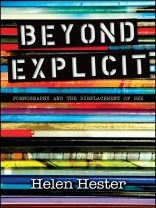Develops a novel characterization of the pornographic as a cultural concept.
This original contribution to porn studies aims to interrogate previously untheorized changes in contemporary understandings of the pornographic. Helen Hester argues that the words ‘porn’ and ‘pornographic’ are currently being applied to an ever-expanding range of material and that this change in language usage reflects a wider shift in perception. She suggests that we are witnessing a seemingly paradoxical move away from sex within contemporary understandings of porn, as a range of other factors come to influence the concept. Using examples from media, literature, and culture, and discussing the rise of notions such as ‘torture porn’ and ‘misery porn, ‘ Hester’s argument ranges from sexually explicit German novels and British policy documents to a discussion of the differences between European and American editions of pornographic films. She concludes that four factors in particular-transgression, intensity, prurience, and authenticity-can be seen to influence the way that we think about porn.
Tabla de materias
Acknowledgments
Introduction: Critical Voices in Porn Studies
Part I: Feminism, Pornography, Transgression
1. The Sex Wars: Transgressive Politics and the Politics of Transgression
2. Rethinking Transgression
3. Sex and Disgust in Popular Culture
Part II: Intensity and Prurience: Pornography after Sex
4. ‘Not All of it Will Get Your Dick Hard’: Pornography and Displacement
5. Prurience and Postmodernism
6. Violence, Sympathy, Titillation: The Body in a State of Intensity
Part III: Pornography and the Real
7. Pornography and the Appetite for Authenticity
8. Autobiography and/as the Real
9. Sex, Trauma, and the Authenticity Effect
Conclusion: Pornographication and the Explosion of the Pornographic
Notes
Works Cited
Index
Sobre el autor
Helen Hester is Lecturer in Promotional Cultures at Middlesex University, London.












